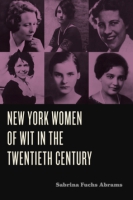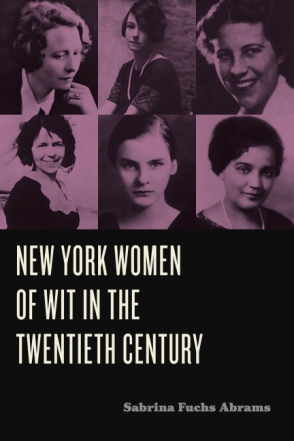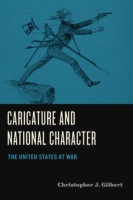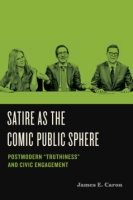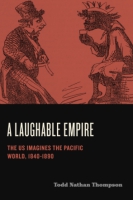New York Women of Wit in the Twentieth Century
Sabrina Fuchs Abrams
“Positioning her study as an insight into feminist humorists today, Abrams effectively shows how women engage with humor to navigate and illuminate intersectional struggles with disability, discrimination, and gendered hierarchies of power to build community among all women.”
- Description
- Reviews
- Bio
- Table of Contents
- Sample Chapters
- Subjects
This book focuses on the women who stood on the periphery of predominantly male New York intellectual circles in the twentieth century. Sabrina Fuchs Abrams argues that the advent of modernism, the women’s suffrage movement, the emergence of the New Woman and the New Negro Woman, and the growth of urban centers in the 1920s and ’30s gave rise to a new voice of women’s humor, one that was at once defiant and conflicted in defining female identity and the underlying assumptions about gender roles in American society. Her study gives special attention to the contributions of the satirists Edna St. Vincent Millay (pseudonym Nancy Boyd), Tess Slesinger, Dorothy Parker, Jessie Redmon Fauset, Dawn Powell, and Mary McCarthy.
Grounded in theories of humor, feminist and critical race theory, and urban studies, this book will find an audience among scholars and students interested in women writers, feminist humor, modern American literature, and African American studies.
“Positioning her study as an insight into feminist humorists today, Abrams effectively shows how women engage with humor to navigate and illuminate intersectional struggles with disability, discrimination, and gendered hierarchies of power to build community among all women.”
“The book is valuable: its focus on ambivalence, rather than humor based simply on superiority or subversion, is a significant contribution to humor studies. Fuchs Abrams helps us understand the sources as well as the payoffs of the conflicted ironies of the six women she discusses and builds a larger picture of a New York world in which different literary circles work through problems of gender in related but not identical ways.”
“Fuchs Abrams’s thoughtful attention to interwar historical and cultural contexts makes New York Women of Wit an excellent contribution to discussions of the subversive nature of satire and irony, the re-fashioning of cultural memory of interwar womanhood, and feminist scholarship on literary institutions.”
“This incredibly readable, comprehensive, and nuanced study brings to light the work of writers who deserve to be better known. Abrams’s enthusiasm and admiration for her subjects is palpable, and readers will appreciate that. New York Women of Wit will appeal to students and scholars of women’s humor, modern U.S. humor, and satire. Moreover, although dedicated to the study of New York women of wit, this book’s thorough engagement with major theories and developments in humor studies makes it a wonderful gateway to the field for curious newcomers.”
“This book never flattens out its subject to construct a single, monolithic New York or gendered ‘type’ of wit. All these writers are represented as complex individuals, whose comedy came in many varieties and served diverse functions, reflecting the creators' identities and the concerns of their different communities. Fuchs Abrams's admiration for these women, with their groundbreaking approaches to urban style and humor, is evident throughout. She does a superb job of making readers share it.”
“Fuchs Abrams makes a critical and overdue intervention in comedy studies with this book. Through personal accounts, criticism, biography, and textual analysis, she gives texture to our understanding of these six women, their impetus for writing, and the response in their own time. New York Women of Wit in the Twentieth Century offers us a persuasive argument for how the legacy of these sardonic writers continues to influence satire, and especially satire written by women, today.”
Sabrina Fuchs Abrams is Professor of English in the School for Graduate Studies at the State University of New York, Empire State. She is the author of Mary McCarthy: Gender, Politics, and the Postwar Intellectual and editor of Transgressive Humor of American Women Writers and Literature of New York. She is founder and cochair of the Mary McCarthy Society and Associate Editor of Studies in American Humor.
Acknowledgments
Introduction: The Female Satirist in the City
1. Nancy Boyd and the Greenwich Village Bohemians: The Secret, Subversive Humor of Edna St. Vincent Millay
2. Dorothy Parker and the “Vicious Circle”: Satire of Modern Love and New York Society
3. Tess Slesinger, the Menorah Journal Group, and the Feminist Socialist Satire of 1930s America
4. Jessie Redmon Fauset, the Harlem Renaissance, and the Radical and Gender Politics of Humor
5. Dawn Powell and the Lafayette Circle: Satirist of Greenwich Village Bohemia and Modern, Midtown Publishing Culture
6. Mary McCarthy and the Partisan Review Crowd: Satire and the Modern Bitch Intellectual
Epilogue: Fighting Funny; Postfeminism, Postracialism, and the Fumorist of the Future
Notes
Bibliography
Download a PDF sample chapter here: Introduction
Also of Interest
Mailing List
Subscribe to our mailing list and be notified about new titles, journals and catalogs.
